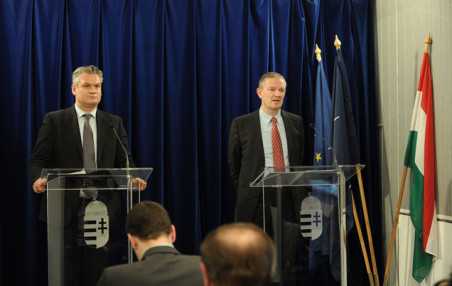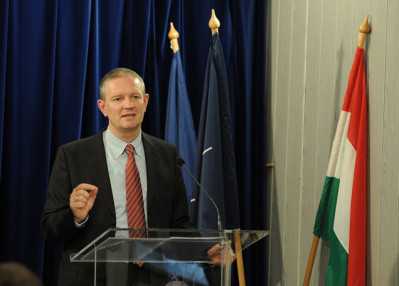Deputy State Secretary: Hungary Is Acknowledged in Security Policy
Szöveg: Hungarian News Agency MTI | 2014. február 20. 15:52Hungary is a globally acknowledged player in international security policy cooperation, crisis management and the non-proliferation of weapons of mass destruction – Szabolcs Takács, Deputy State Secretary for Security Policy of the Ministry of Foreign Affairs stated on Wednesday, February 19 in Budapest.
Péter Siklósi reminded his audience that they had halted the trend of shrinking defence budgets, a process which started in 2004, and had committed themselves to a gradual increase of this budget from 2016 on.

Both speakers said that in their assessment, the cooperation within NATO and Hungary’s participation in the Afghanistan and the Balkans missions had been successful.
In spite of cost reductions, they managed to keep up the high-level role of the Hungarian Defence Forces in foreign missions, Péter Siklósi said. Besides NATO-led operations, they focused on EU-led ones, but they also participated in UN- and OSCE-led operations and in the MFO as well.
In his opinion, NATO highly appreciates Hungary’s contribution to operations. He also pointed out that the greatest challenge had been the mission in Afghanistan, from where the Hungarian troops would be redeployed to areas of operations in the Balkans, Kosovo and Bosnia-Herzegovina.
Speaking about the NATO radar station in Medina, he stated that the technical acceptance procedure of the complex would be completed in February.
Péter Siklósi said that in the framework of cooperation with strategic partners, in particular with the United States, Hungary had received since 2010 a financial support of more than USD 35 million from different funds.
He also noted that the Gripen lease contract had been successfully renegotiated and extended, under more favorable terms, for 10 years starting from 2016.
He added that by the end of this year, they expect to achieve the target they have set, and the system of volunteer reserve would have a manning level of 8,000. The first operational reservist has already been deployed and is currently serving in Africa.

Szabolcs Takács agreed that NATO fully recognizes Hungary and there are regular discussions with NATO leaders. Speaking about the NATO-led missions, he also said that stabilizing and democratizing the region of the Western Balkans is an issue of high priority for Hungary, and that Euro-Atlantic integration is the best means to achieve this goal.
He also mentioned that the Ministry of Foreign Affairs participates in shaping the common foreign policy of the European Union, and considers the cooperation of the Visegrád countries as highly important.
According to Szabolcs Takács, considering its weight, Hungary has been able to play a significant role in various cooperative efforts in the fields of disarmament and arms control. He said it was important that between 2011 and 2013 Hungary had been a member of the Board of Governors of the Vienna-based International Atomic Energy Agency (IAEA). The Deputy State Secretary also noted that the Minister of Foreign Affairs had been the President of the IAEA International Conference on Nuclear Security, and that Hungary had a key role in the Comprehensive Nuclear Test-Ban Treaty as well.
He added that Hungary had been invited to join a 25-member governmental working group convened by the UN Secretary General and set up under the Fissile Material Cutoff Treaty.